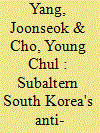| Srl | Item |
| 1 |
ID:
172802


|
|
|
|
|
| Summary/Abstract |
This study uses a postcolonial approach to focus on the relations between the dominator/colonizer and the subordinated/colonized to reveal how the imperial legacy continues to influence the current relations between Japan and South Korea. The sources of current tensions between Japan and South Korea are threefold: First, the continuity of Japan's worldview inherited from the imperial era still influences Japan's interpretation of historical disputes with its former colonies. Second, decolonization has not been achieved between Japan and South Korea due to the Cold War and pressure from the United States to shelve historical disputes amid the normalizing of relations between Japan and South Korea. Third, as a subaltern state, South Korea was caught between pursuing complete independence and autonomy and collaboration with its past colonizer in the state-building process. This approach sheds new light on the multiplicity of the disputes between the two countries and explains why negative colonial legacies still haunt Japan and its relations with South Korea.
|
|
|
|
|
|
|
|
|
|
|
|
|
|
|
|
| 2 |
ID:
172803


|
|
|
|
|
| Summary/Abstract |
This article considers the 1950s postcolonial period in Korea after Japanese colonialism and the international context of the Cold War from the standpoint of the ROK and examines how the subaltern South Korean state (re)appropriated and (re)formulated the Cold War discourse of anti-communism in Asia. During that period, South Korea, along with other East Asian states, formed an international association called the Asian Peoples' Anti-Communist League (APACL). During the 1950s, the subaltern ROK thus joined a new, nuanced, Western-centric (if not colonial) structure—the Cold War—and proactively and strategically appropriated anti-communism to ensure its national survival. Carving out a place at the bottom of the Western-centric Cold War hierarchy became part of state building for non-Western South Korea. Moreover, the Cold War was a context in which ideology (anti-communism) mixed with blood (war and violence) on a daily basis. Subaltern South Korea was constitutive of the Cold War in Asia and beyond. Indeed, this article illustrates that the Cold War itself was a co-construction between the hegemonic powers and subalterns.
|
|
|
|
|
|
|
|
|
|
|
|
|
|
|
|